IOS, JIT Seminar on “Technology and Youth”
April 6, 2019 at Jahangirabad Institute of Technology, Barabanki, UP
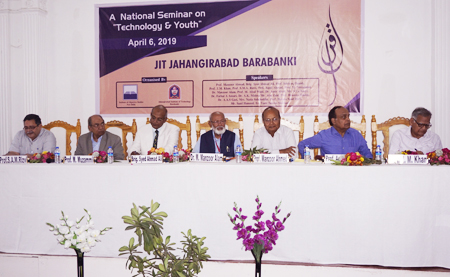
L-R: Prof. SMA Rizvi, professor and HoD, deptt. of computer sciences, Jamia Millia Islamia; Prof. M Muzammil, former vice-chancellor, Dr. BR Ambedkar University, Agra and MJP Rohilkhand University, Bareilly; Brigadier Syed Ahmad Ali (retired), Director of Jahangirabad Institute of Technology, Barabanki-UP; Dr. M. Manzoor Alam, chairman, IOS; Prof. Manzoor Ahmed, former vice-chairman of IOS and ex-director of JIT; Prof. Aquil Ahmed, vice-chancellor of Integral University, Lucknow; Prof. ZM Khan, Secretary General, IOS
Inaugural Session
A one-day national seminar on “Technology and Youth’ was organised by the Institute of Objective Studies in association with Jahangirabad Institute of Technology, Barabanki, UP, on April 6, 2019. Brigadier Syed Ahmad Ali (retired), Director of Jahangirabad Institute of Technology, in his welcome address traced the history of the institution and said that its journey was progressively on and the day was not far when it would also be dotted on the map of the country’s prominent institutions of technical education.
He insisted that the JIT had created a conducive environment for education and training on the campus. What technology foresaw for the youth could be explained in terms of ages. These ages were chronological, biological and psychological. As far as the chronological age was concerned, it was in the hands of the youth to choose education. Technology had nothing do with youth per se. Life span of a person was increasing. The world was in a flux and nothing was stationary in this connection.
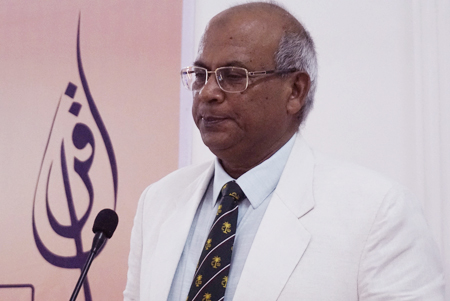
He referred to a Western film which, despite good cast and other parameters flopped because it did not keep pace with the changing paradigm of technology. For instance, digital cameras had replaced old cameras with precision and high resolution of images. This became possible due to miniaturisation of technology, he noted, adding that the technology would keep on refining.
This applied to all technology-driven products because one subject led to research on other subjects. Change in technology was so fast that today’s cars were poised to be replaced by electrical cars. He said that today software had been developed that could advise you within split seconds. Similarly, electricity would become cheaper as every household would install solar energy panels on its roof. He contended that one would find what one wanted as it would not be decided by fate, but the latest technology.
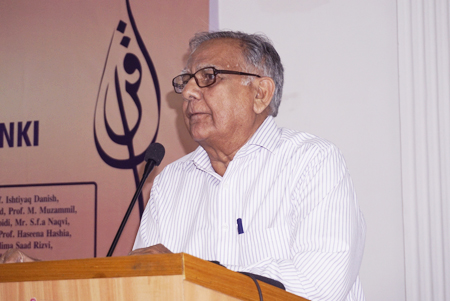
In his introductory speech, the Secretary General, IOS, Prof. ZM Khan, said that the institute had completed 33 years of its existence. Established in 1986, the IOS had Patna, Kolkata and Aligarh chapters that dealt with regional issues. Referring to its institutional structure, he said that the General Assembly and the Governing Council were the two apex bodies of policy planning and execution. Outlining the functions of the institute, he noted that it included conduct of research on important themes.
There was a mechanism to select the subject of research. The institute was also tasked with conducting surveys on socio-economic status of marginalised sections, including the minorities, especially Muslims. In order to hook surveys to accuracy, the Institute had built up a data base that also catered to the needs of other agencies. Besides, he said that the Institute was engaged in publishing high-quality books on various subjects that ranged from religious studies to sociology, politics and current issues in Urdu, English, Hindi, Arabic and India’s regional languages.
Magazines and periodicals were also published on a regular basis. Research scholars pursuing their Ph.D. degrees were awarded scholarships. National and international conferences, seminars, symposia were organised in Delhi and at other places. He held that the Institute had expanded its horizon by entering into collaboration with other institutions for holding seminars. He said that the youth was encouraged to proactively associate itself with the IOS and take the caravan forward. He said that the direction of speed should provide a cognitive structure. Let it not be directionless, he added.
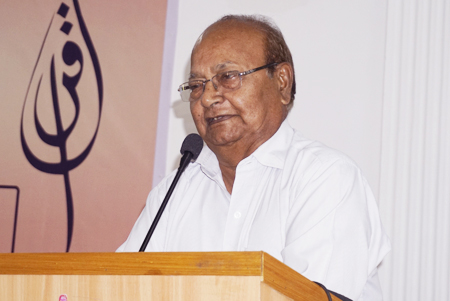
Inaugurating the seminar, the retired senior police officer, former vice-chairman of IOS and ex-director of JIT, Prof. Manzoor Ahmed recalled his association with JIT and said that institutions were built not only with money, but also with a sense of belonging to them. Remembering his days as vice-chancellor of Agra University, he said that he started an engineering college and a college of life sciences without getting a paisa from government. The college of life sciences was adjudged the best institution in the country for two consecutive years. Laying emphasis on courses that offered gainful employment to youth, he said that currently, only 18 percent of them got employment and the rest 82 percent were thrown out as unemployed. As education stood today, urban students had access to good education, but rural students were disadvantaged due to lack of infrastructure.
He suggested that students should be given the option to choose the stream of their liking. This should be followed by the provision of basic infrastructure so that they could pursue the courses conveniently. He insisted that technology should not be misused. It must be value-based, he concluded.
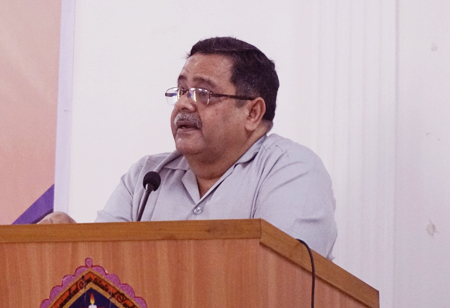
In his keynote address, professor and HoD, deptt. of computer sciences, Jamia Millia Islamia, Prof. SMA Rizvi, remarked that Internet provided real democracy because it was of the people, for the people and by the people. This had transcended borders of countries across the globe. He said that every knowledge and technology was for the humankind. Everything was susceptible to change and in today’s changing times if one did not know Internet, he would be treated as an illiterate. But the problem started when it reached the extreme. Under the circumstances, what was needed was to also know what was happening in other areas.
He exhorted students at JIT to excel in their field of study, so that the industry came to them for placement through campus recruitment. He asked students to perceive change that was taking place by giving the example of Nokia, once the world’s largest mobile manufacturing company. He said that the employability of the course a student was pursuing was important. Emphasising the need for translational research, he viewed infrastructure development, content development and user problem as the areas that required to be accorded utmost priority. Creation of smart machines, smart houses and smart villages were real challenges of today, he stated.
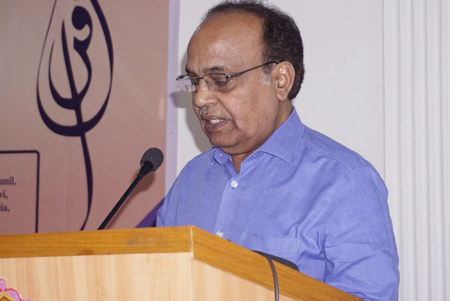
Addressing the seminar as a guest speaker, vice-chancellor of Integral University, Lucknow, Prof. Aquil Ahmed, pointed out that technology had changed so much that it had now become an inseparable part of life. The use of technology was being hotly debated today, when life without technology was unimaginable. This could be well illustrated by the use of smart phones that had become an extension of ourselves. He said that innovations in technology had been made to necessitate its use in examinations, jobs, accounts, on-line shopping, etc. Similarly, several universities had created virtual classrooms and its use had been extended to the defence sector as well.
He held that innovations in technology were welcome but 24 hours were not enough to get all things done. Google had answers to all questions and no one ever questioned it. Technology was a boon and bane at the same time, if not used for the benefit of the people. It was up to the user how to take the magic of technology, he remarked.
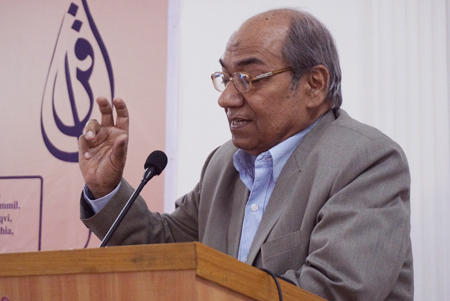
Another guest speaker was Prof. M Muzammil, former vice-chancellor, Dr. BR Ambedkar University, Agra and MJP Rohilkhand University, Bareilly, who held that both youth and technology were changing fast. Age of the youth was changing because of stress, mental ability and technology. This illustrated how technology worked for human development. He said that there were two ways to measure technology development index. One was the creation of new technology and the other was the diffusion of technology. Mention of technology and its spread were two different things.
He said that technology-driven expertise was the diffusion of technology. Per capita clean and sustainable energy fell under this category. Defining science, he said that it was the creation of new knowledge and its application was known as technology. Social sciences, he maintained, were the use of technology for human development. Technology was the tool of development and they were complementary to each other. He said that technology was taking humans from stage to stage and thus helping human development. Technology ensured better, fuller, protected and healthier life. Without technology, life would be monotonous, he remarked.
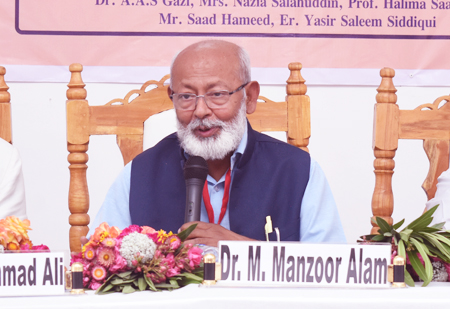
In his presidential address, the chairman, IOS, Dr. M. Manzoor Alam, observed that technologies changed societies drastically, altered power equations, economic well-being and moral order. The development of wider blades in ploughs in Europe increased agricultural production so much so that sufficiency of food increased population dramatically. Soon Europe was full of people, a condition that ultimately led to their conquest of Asia, Africa as well as North America, and development of European settler communities in those lands, including Australia and New Zealand. That also led to the enslavement of local population and their genocide.
He said that technologies generated at one place changed not only that place, its society its economy, its moral values, locally, but sometimes they had a global impact like the plough or Industrial Revolution in Europe. IT-dependant and IT-enabled technologies were sweeping the world today as they had a role in our homes and offices, our agricultural farms and factories, in the production, distribution and consumption of goods and services anywhere on the earth, from advanced countries to developing and least-developed countries.
Yet, this revolution began from a relatively small area, Silicon Valley, in the San Francisco Bay Area of the United States. Referring to the impact of technology, Dr. Alam said that nearly always, it was not the technology itself, but the human misuse and abuse of it that was responsible for harming themselves or others. For instance, nuclear technology was being used in both diagnostics and treatment of diseases as well as in farming and electricity production. This happened to be the cleanest mass-scale electricity far more than solar, hydro or wind energy.
He held that we could talk about hundreds of technologies developed over last ten thousand years of human civilisation. Even the very first technology (fire) or the technology that came after that (wheel) changed life dramatically and continued to do so today, both for war and peace. They could both help and harm, depending on their use.
Turning to the youth, he said that we were moving towards very uncertain and challenging times. The most important would be an extraordinarily large number of jobs lost as new technologies would kick in, making old skills redundant. Artificial Intelligence would replace a lot of human jobs as would robotics. He observed that one time B. Tech, M. Tech and other degrees would not save jobs.
There was going to be an age of life-long learning requiring new degrees, diplomas and certificates every few years to cope with the demands of new work places, new jobs, new business-management styles. Already, big universities and institutions were offering highly diversified courses, degrees, diplomas and certificates, besides normal, traditional courses, he concluded.
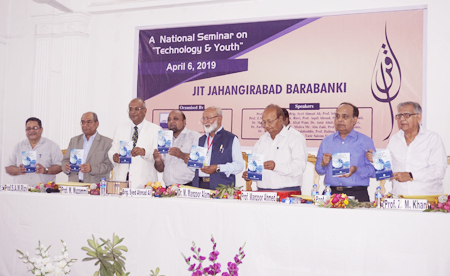
A view of Book Release
The inaugural session was marked by the release by Brig. Ali, of the book Challenges Before Youth in Contemporary World, edited by Prof. Ishtiyaque Danish. Earlier, the session began with the recitation of a Quranic verse by Hafiz Salman Nadvi, Pesh Imam, JIT. Prof. Ishtiyaque Danish, finance secretary, IOS conducted the proceedings.
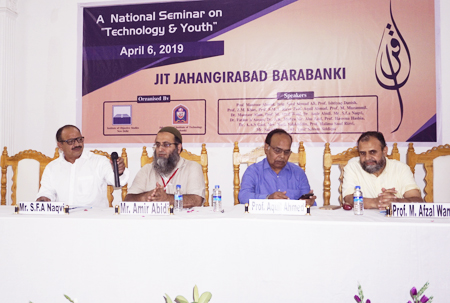
L-R: SFA Naqvi, senior technical director, National Information Centre, Lucknow; Dr. Amir Abidi, founder, Taraqqi Foundation, Gurgaon; Prof. Aquil Ahmed, vice-chancellor of Integral University, Lucknow; Prof. M. Afzal Wani, vice-chairman, IOS and professor of law, GGSIP University, New Delhi
Business Session I
The inaugural session was followed by business session-I. The session was devoted to “Indian Developmental Scenario: Marginalised Sections and Technology” presided over by Prof. Aquil Ahmed. The session had SFA Naqvi, senior technical director, National Information Centre, Lucknow, who spoke on the disadvantages of the use of technology. He was followed by Prof. M. Afzal Wani, vice-chairman, IOS and professor of law, GGSIP University, New Delhi, who pleaded for the use of technology not for destruction but for the welfare of human species. The last speaker of the session was Dr. Amir Abidi, founder, Taraqqi Foundation, Gurgaon, who predicted that by 2022 every Indian would have a smart phone.
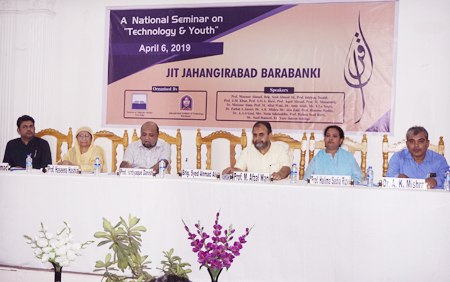
L-R: Mr. Akif Ahmad, founder, Interest Aid Foundation, NOIDA; Prof. Haseena Hashia, asstt. secretary general, IOS & ex-professor, deptt. of geography, Jamia Millia Islamia, New Delhi; Prof. Ishtiyaque Danish, finance secretary, IOS; Prof. M. Afzal Wani, vice-chairman, IOS and professor of law, GGSIP University, New Delhi; Prof. Halima Sadia Rizvi, head, deptt. of economics, Jamia Millia Islamia, New Delhi; Dr. A. K. Mishra, principal, polytechnic, JIT
Business Session II and III
The second and third business session on “Technology as tool of Empowerment of Muslims in India” and “Technology and Job Creations in Different Sectors of Indian Economy” respectively were joined together. The joint session was chaired by Prof. M. Afzal Wani. The first speaker at the session was Prof. Ishtiyaque Danish, followed by Prof. Haseena Hashia, asstt. secretary general, IOS & ex-professor, deptt. of geography, Jamia Millia Islamia, New Delhi, Prof. Halima Sadia Rizvi, head, deptt. of economics, Jamia Millia Islamia, New Delhi, and Mr. Akif Ahmad, founder, Interest Aid Foundation, NOIDA, were third and fourth speakers. They were followed by Mr. A.A.S. Ghazi, principal, Engineering College, JIT and Dr. A. K. Mishra, principal, polytechnic, JIT respectively. The seventh speaker was Dr. Farhat Ayesha Ansari, head of the department of applied science, JIT, followed by Nazia Salauddin, librarian, department of library, JIT. The last two speakers of the session were Mr. Mohammad Irshad Ahmed, head of the department of electrical engineering, JIT, Mr. Yasir Saleem Siddiqui, head of the department of civil engineering, JIT respectively.
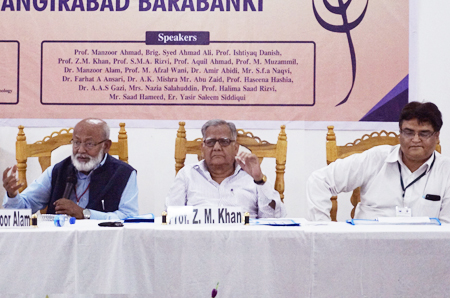
L-R: Dr. M. Manzoor Alam, chairman, IOS; Prof. ZM Khan, Secretary General, IOS; Mr. Khushnood Nizami, administrative officer of JIT
Concluding Session
The concluding session was presided over by Dr. M. Manzoor Alam who urged the youth to take the initiative for changing the world because it was they who could bring about a change. The world was confronted with the challenges of technology and a responsibility devolved on the youth to find ways and means to bridge the gap created by it. Since the software technology was suited to girls most, they needed to develop the intellect to use technology.
Commenting on the international code of education that required that the population of a country should be taught in its mother tongue, he said that only 4 percent Muslims received education in madarsas. Rest of them were getting education in modern schools. He advised the students to access the website of the IOS that contained every information with regard to its activities, including conferences, seminars and symposia.
While asking the young participants in the seminar to work for the restoration of human dignity irrespective of caste, creed and religion, he encouraged them to prepares papers and send them to the IOS for being included in a book to be published in the near future.
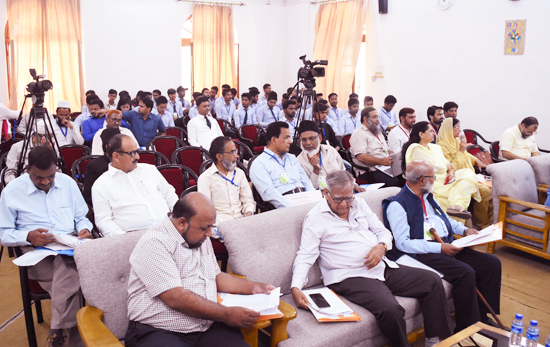
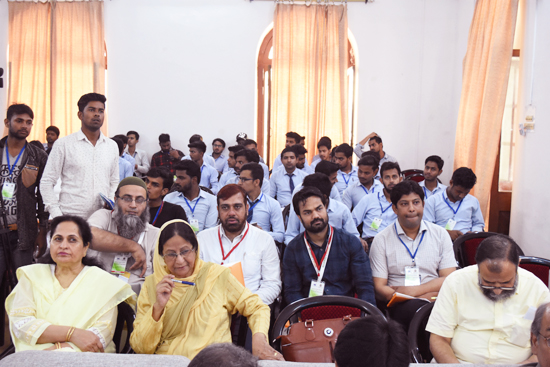
Views of audience
The seminar concluded with a vote of thanks extended by the administrative officer of JIT, Khushnood Nizami. A 5-point resolution unanimously adopted by the participants and delegates on the occasion, was read out by Prof. ZM Khan. The resolution read:
1. Efforts should be made to make human life worth living through creating human skills to use technology in a balanced manner.
2. It is urgently needed to develop educational and research methods to accommodate developments in areas of technology. To fulfill this objective, necessary steps may be taken at all levels.
3. Cooperation patterns among various institutions and organisations should be worked out for putting them in operation with the help of MOUs.
4. Concepts of unity of knowledge may be worked out to create proper balance in different sectors of society.
5. Necessary inputs from social sciences into making technology viable for human development must be introduced.
Go Back